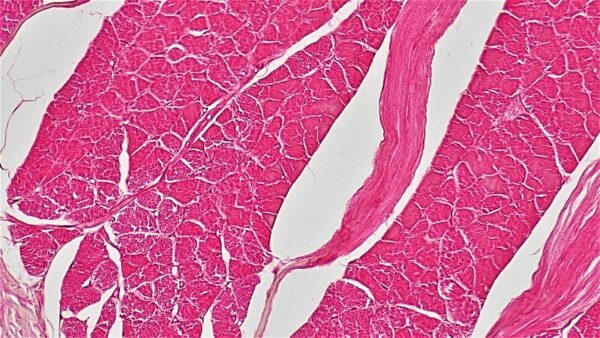
A PepGen drug in development for myotonic dystrophy type 1 (DM1) has encouraging early human data that suggest it could be a better treatment than other medicines in clinical testing for this rare, inherited neuromuscular disorder that currently has no FDA-approved therapies.
PepGen said its drug candidate, PGN-EDODM1, led to a dose-dependent increase in splicing correction, which is the fixing of errors in a gene sequence. In the four evaluable patients who received a single 10 mg intravenous infusion, the higher of the two doses tested so far, the results released Monday show the average splicing correction was 29.1% measured at 28 days. Boston-based PepGen expects these results will get even better.
“Mis-splicing is the known cause of DM1, and we believe that with repeat and higher dosing, PGN-EDODM1 has the potential to produce greater splicing correction levels, which could lead to improved functional outcomes for patients,” the company said in an investor presentation.
DM1 leads to progressive weakening of muscles. This disease stems from a mutation to the DMPK gene that results in toxic RNA. Antisense oligonucleotides (ASOs) offer one approach to treating genetic diseases. While ASOs can be used to degrade RNA that drives a disease, PepGgen is developing drugs that block it. These drugs are made with Enhanced Delivery Oligonucleotide (EDO), PepGen’s technology for engineering peptides to deliver ASO cargos to destinations in the body.
The Phase 1 single-ascending dose study is designed to enroll up to 32 adults with DM1. The study is starting with 5 mg per kilogram of patient weight and 10 mg/kg doses, escalating to 15 mg/kg and potentially 20 mg/kg if safety data support higher dosing. Patients receive muscle biopsies at baseline, day 28, and week 16. Functional outcome measures at day 28 include a 10 meter walk/run test measure and assessment of myotonia, or muscle stiffness. The company said the early results show positive early trends in these functional measures.
Leerink Partners analyst Joseph Schwartz said in a research note that the Pepgen DM1 data so far are competitive with ASO degrading therapies in development by Avidity Biosciences and Dyne Therapeutics. For context, Avidity’s del-desiran showed 3% splicing correction after a single 1 mg dose while Dyne’s DYNE-101 showed 13% splicing correction at the lowest dose measured at three months. Pepgen’s preliminary results also top the 25% splicing correction mark achieved by the Dyne therapy’s highest dose, which is the dose continuing through Phase 1/2 development.
While the early signs of efficacy are encouraging, safety was a major concern in light of the December clinical hold placed on PepGen’s plans to advance a Duchenne muscular dystrophy therapy to Phase 2 testing. Pepgen said the DM1 drug continues to show a favorable safety profile. As of a Dec. 3 data cutoff, the company said there were no adverse events related to electrolytes or renal biomarkers, which were concerns for the Duchenne study.
Schwartz said Leerink is encouraged that safety appears to be cleaner than what has been observed for PepGen’s Duchenne therapy. He added that the firm hasn’t written off the Duchenne program, which may be able to thread the needle between safety and efficacy. In its report of fourth quarter and full year 2024 financial results released Monday, PepGen said it is working with the FDA to address questions about supportive data for dosing levels in the study’s planned patient population.
More data from the Phase 1 test of the PepGen DM1 drug are coming. The company expects data from the 15 mg/kg cohort will become available in the second half of this year. Meanwhile, a separate study is underway to see whether multiple doses over longer periods of time lead to better patient outcomes. This placebo-controlled multiple-ascending Phase 2 test will evaluate the study drug in about 24 adults. The company said it expects to report results from the 5 mg/kg cohort in the first quarter of next year.
As of the end of 2024, PepGen said its cash position was $120.2 million, which it estimates is sufficient to last into 2026.
Public domain image by Flickr user Berkshire Community College Bioscience Image Library










